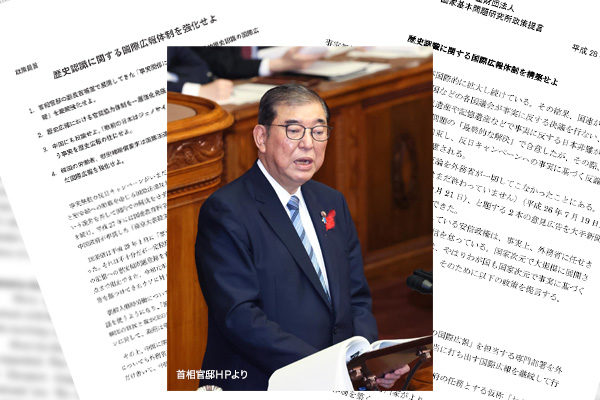The Japan Institute for National Fundamentals (JINF) has repeatedly published policy proposals to ask the government to address the historical awareness issue. In response, the Shinzo Abe administration established a system for the Office of the Assistant Deputy Chief Cabinet Secretary at the Prime Minister’s Office to tackle the issue. The system was maintained by the administrations of Yoshihide Suga and Fumio Kishida. Specifically, an assistant to the prime minister, a politician, was appointed in charge, and the Office of the Assistant Deputy Chief Cabinet Secretary oversaw the whole government as the secretariat in cooperation with the assistant.
Unclear if the international PR system will be maintained
In January 2016, JINF published a policy proposal to establish an international public relations system for historical awareness within the government, which was accepted by the Abe administration and led to the creation of above-mentioned system. In November 2021, JINF published another proposal to enhance the PR system and urged the Kishida administration to take over the above system.
In January 2022, the ruling Liberal Democratic Party’s then Policy Research Council Chair Sanae Takaichi told Prime Minister Kishida in the Diet: “It is necessary to continue and strengthen international public relations for systematic fact-based historical awareness in order to protect Japan’s honor and national interests.” She asked Kishida: “Is the Office of the Assistant Deputy Chief Cabinet Secretary still in charge of international public relations for historical awareness under the Kishida Cabinet?” Kishida replied: “My Cabinet has taken over the system existing since the Abe Cabinet on the issue of historical awareness, and I would like the entire government to tackle historical issues, including through international public relations, centering around the Office of the Assistant Deputy Chief Cabinet Secretary.”
JINF is closely monitoring whether the Shigeru Ishiba administration will take over this system. So far, there has been no clear message from Prime Minister Ishiba on this matter.
China prepares anti-Japanese movie focusing on Unit 731
Meanwhile, the importance of historical awareness issue is increasing more than ever. Recent incidents such as graffiti at the Yasukuni Shrine and attacks on Japanese school children in China show that the Japan-China historical awareness issue must be addressed without delay. The Chinese Communist Party is preparing a campaign for the next year to mark the 80th anniversary of the victory in the “anti-Japanese, anti-fascist war.” It is working on a movie to accuse the crime of Japanese militarism focusing on Unit 731 of the Japanese Army, which is said to have tested biological weapons during the war. The movie is to be released worldwide next year.
In the policy proposal in 2021, we urged the government to refute Chinese claims and base its public relations campaign regarding historical awareness on the fact that Japan had never committed genocide or any crime against humanity. The proposal has yet to be implemented. On the Nanjing Incident, the website of Japan’s Ministry of Foreign Affairs still writes, “The Government of Japan believes that it cannot be denied that following the entrance of the Japanese Army into Nanjing in 1937, the killing of noncombatants, looting, and other acts occurred.” It has fallen short of asserting that a Chinese claim that hundreds of thousands of people were massacred is not true.
In its manifesto, or Policy Bank, for the upcoming general election, the LDP used less than two lines to say, “We will take a resolute response to issues related to Japan’s sovereignty and honor, promote historical and academic research, and strengthen Japan’s strategic communication to the rest of the world." Three years ago, the LDP Policy Bank used more than four lines to say, “We will calmly and resolutely respond to challenges that affect Japan’s sovereignty and honor and the Japanese people’s lives, safety, and property, such as China’s military buildup and attempt to unilaterally change the status quo, and human rights, Hong Kong, and economic issues in China, as well as South Korea’s violation of international law and its gratuitous accusations against Japan over historical awareness and other issues.” It thus clarified the LDP’s determination to tackle the historical awareness issue, although it is limited to such issue between Japan and South Korea.
Tsutomu Nishioka is a senior fellow and a Planning Committee member at the Japan Institute for National Fundamentals and a visiting professor at Reitaku University. He covers South and North Koreas.


